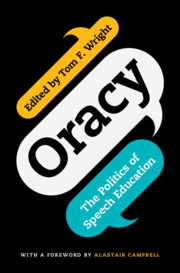Book contents
- Oracy
- Oracy
- Copyright page
- Contents
- Figures
- Tables
- Contributors
- Foreword: The Oracy That Democracy Needs
- Acknowledgements
- Introduction
- Part I Debating Oracy in the UK
- 1 Listening without Prejudice
- 2 Oracy and Social (In)Justice
- 3 Fluency for Me, But Not for Thee?
- 4 What is the relationship between oracy edcuation and confidence for students and teachers?
- 5 Lend Me Your Ears
- 6 Defending Oracy
- Part II Oracy in Global Context
- Part III Oracy in History and in Theory
- Index
- References
3 - Fluency for Me, But Not for Thee?
Why Disadvantaged Communities Deserve Oracy
from Part I - Debating Oracy in the UK
Published online by Cambridge University Press: 23 September 2025
- Oracy
- Oracy
- Copyright page
- Contents
- Figures
- Tables
- Contributors
- Foreword: The Oracy That Democracy Needs
- Acknowledgements
- Introduction
- Part I Debating Oracy in the UK
- 1 Listening without Prejudice
- 2 Oracy and Social (In)Justice
- 3 Fluency for Me, But Not for Thee?
- 4 What is the relationship between oracy edcuation and confidence for students and teachers?
- 5 Lend Me Your Ears
- 6 Defending Oracy
- Part II Oracy in Global Context
- Part III Oracy in History and in Theory
- Index
- References
Summary
In this chapter, Qamar Shafiq, an experienced teacher of English from Staffordshire, assesses the practical implications of critiques of oracy education for ethnic minority pupils. He urges nuanced perspectives and practical strategies for academic success across backgrounds. He challenges low expectations, advocating fluency in standard English for societal integration and equal opportunities. Drawing from personal experiences as someone whose first language was not English, he stresses educators’ role in enhancing linguistic skills while respecting cultural diversity. Shafiq promotes a balanced approach supporting both oracy and standard English proficiency, rejecting hindering radical ideologies. Ultimately, he asserts the pragmatic case that marginalized groups require a solid foundation in oracy and standard English for success in education and beyond.
Information
- Type
- Chapter
- Information
- OracyThe Politics of Speech Education, pp. 40 - 45Publisher: Cambridge University PressPrint publication year: 2025
References
Accessibility standard: WCAG 2.2 AAA
Content Navigation
Allows you to navigate directly to chapters, sections, or non‐text items through a linked table of contents, reducing the need for extensive scrolling.
Provides an interactive index, letting you go straight to where a term or subject appears in the text without manual searching.
Reading Order & Textual Equivalents
You will encounter all content (including footnotes, captions, etc.) in a clear, sequential flow, making it easier to follow with assistive tools like screen readers.
You get concise descriptions (for images, charts, or media clips), ensuring you do not miss crucial information when visual or audio elements are not accessible.
You get more than just short alt text: you have comprehensive text equivalents, transcripts, captions, or audio descriptions for substantial non‐text content, which is especially helpful for complex visuals or multimedia.
Visual Accessibility
You will still understand key ideas or prompts without relying solely on colour, which is especially helpful if you have colour vision deficiencies.
You benefit from high‐contrast text, which improves legibility if you have low vision or if you are reading in less‐than‐ideal lighting conditions.
